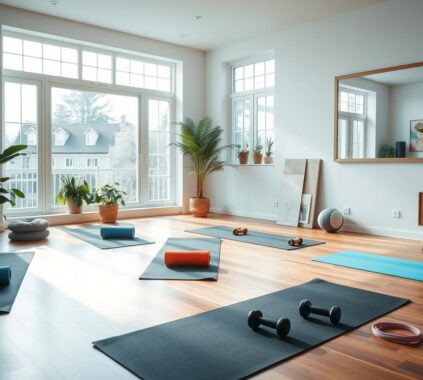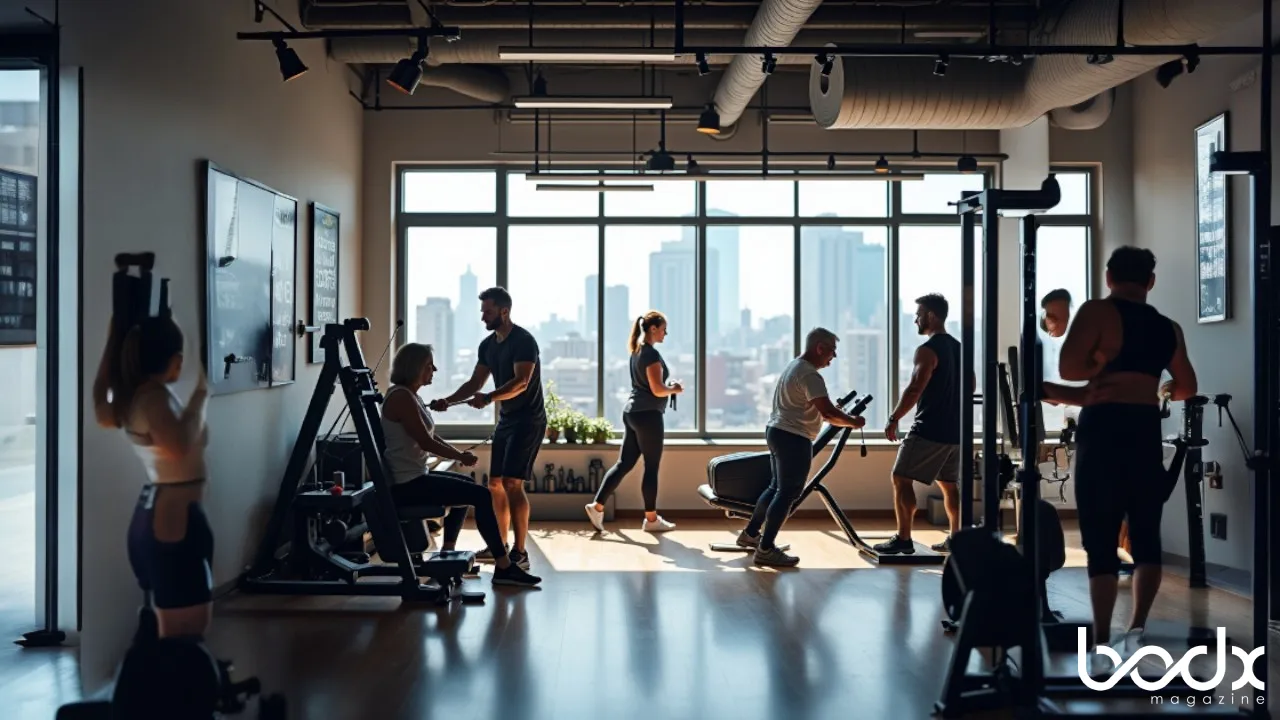Introduction
Are you ready to explore new heights with fitness and exercise? Whether you’re a beginner or an experienced athlete, there’s always room to improve your fitness routine. This guide will take you through everything you need to know to boost your fitness level, from the basics of starting a workout routine to advanced techniques that can help you achieve your goals. Get ready to embrace a healthier, stronger, and more vibrant you!
The Benefits of Regular Exercise
Why Exercise Matters
Regular exercise is not just about looking good; it’s about feeling good. Engaging in physical activity can:
- Improve cardiovascular health
- Boost mental health and mood
- Enhance strength and endurance
- Promote weight management
- Increase flexibility and balance
Physical Health Benefits
Exercise plays a crucial role in maintaining physical health. Regular workouts can help reduce the risk of chronic diseases such as heart disease, diabetes, and obesity. They also strengthen muscles and bones, improving overall body function and longevity.
Mental Health Benefits
Exercise is a powerful tool for mental health. It releases endorphins, which are natural mood lifters. This can help reduce stress, anxiety, and symptoms of depression. Additionally, regular physical activity can improve sleep quality, cognitive function, and overall emotional well-being.
Creating Your Fitness Plan

Setting Realistic Goals
Before diving into a new fitness routine, it’s essential to set realistic and achievable goals. Whether you want to lose weight, build muscle, or improve your overall fitness, having clear objectives will help you stay motivated and track your progress.
Choosing the Right Exercise
Different types of exercise offer various benefits. Here’s a quick overview:
- Cardiovascular Exercise: Activities like running, cycling, and swimming improve heart health and endurance.
- Strength Training: Lifting weights or using resistance bands helps build muscle mass and strength.
- Flexibility and Balance: Yoga and Pilates enhance flexibility, balance, and core strength.
Designing Your Workout Routine
A balanced workout routine should include a mix of cardiovascular exercise, strength training, and flexibility work. Aim for at least 150 minutes of moderate-intensity aerobic activity or 75 minutes of vigorous-intensity aerobic activity each week, combined with muscle-strengthening activities on two or more days a week.
Listening to Your Body
It’s crucial to listen to your body and avoid overtraining. Rest and recovery are as important as the workouts themselves. Ensure you get enough sleep, stay hydrated, and incorporate rest days into your routine to allow your body to recover and prevent injuries.
Nutrition and Hydration
Eating for Performance
Nutrition plays a significant role in fitness and exercise. Eating a balanced diet that includes a variety of nutrients can enhance your performance and recovery. Focus on:
- Carbohydrates: Provide energy for your workouts.
- Proteins: Essential for muscle repair and growth.
- Fats: Important for overall health and hormone production.
Pre-Workout and Post-Workout Nutrition
What you eat before and after your workouts can significantly impact your performance and recovery. A good pre-workout meal should include carbohydrates and some protein, while a post-workout meal should focus on protein and healthy fats to aid in muscle recovery.
Staying Hydrated
Hydration is critical for maintaining performance and preventing dehydration. Aim to drink plenty of water throughout the day, especially before, during, and after your workouts. Dehydration can lead to fatigue, decreased performance, and even serious health issues.
Advanced Fitness Techniques
High-Intensity Interval Training (HIIT)
HIIT involves short bursts of intense exercise followed by brief rest periods. This type of training is highly effective for burning calories, improving cardiovascular fitness, and increasing metabolic rate.
Strength Training and Progressive Overload
Strength training should be progressive, meaning you gradually increase the weight, frequency, or number of repetitions in your workouts to continue challenging your muscles. This approach promotes muscle growth and strength gains over time.
Flexibility and Mobility Work
Incorporating flexibility and mobility exercises into your routine can improve your range of motion, reduce the risk of injuries, and enhance overall performance. Practices like yoga and dynamic stretching are excellent for maintaining and improving flexibility.
Tracking Your Progress
Keeping track of your workouts, diet, and overall progress can help you stay motivated and make necessary adjustments to your routine. Use fitness apps, journals, or trackers to monitor your achievements and set new goals.
Staying Motivated
Finding Your Motivation
Motivation can fluctuate, but finding what drives you is key to staying committed to your fitness journey. Whether it’s the desire to improve your health, the joy of competition, or the thrill of achieving new personal bests, identifying your motivation will keep you focused.
Creating a Support System
Having a support system can make a significant difference in maintaining your fitness routine. This can include workout partners, fitness classes, or online communities where you can share your progress, challenges, and achievements.
Rewarding Yourself
Setting up a reward system for reaching your fitness goals can be a great motivator. Treat yourself to something you enjoy, whether it’s a new workout outfit, a relaxing massage, or a fun activity, every time you hit a milestone.
Common Challenges and How to Overcome Them
Dealing with Plateaus
Fitness plateaus can be frustrating, but they are a normal part of any fitness journey. To overcome them, try changing your routine, increasing intensity, or setting new goals to keep your body challenged.
Managing Time
Finding time to exercise can be challenging with a busy schedule. Prioritize your workouts by scheduling them as you would any other important appointment. Even short, high-intensity workouts can be effective if time is limited.
Preventing Injuries
Injuries can derail your fitness progress. Prevent them by using proper form, gradually increasing intensity, and incorporating rest days into your routine. If you do get injured, seek professional advice and allow ample time for recovery.
Conclusion
Exploring new heights with fitness and exercise is a journey that requires dedication, motivation, and the right approach. By understanding the benefits of regular exercise, creating a tailored fitness plan, focusing on nutrition and hydration, and staying motivated, you can achieve your fitness goals and enjoy a healthier, more active lifestyle. Remember, every step you take towards improving your fitness is a step towards a better, more vibrant you.
FAQs
What is the best type of exercise for overall fitness?
There isn’t a one-size-fits-all answer, as the best type of exercise depends on your fitness goals and preferences. A mix of cardiovascular, strength, and flexibility exercises is generally recommended.
How often should I work out?
Aim for at least 150 minutes of moderate-intensity aerobic activity or 75 minutes of vigorous-intensity aerobic activity each week, combined with muscle-strengthening activities on two or more days a week.
What should I eat before and after a workout?
A pre-workout meal should include carbohydrates and some protein, while a post-workout meal should focus on protein and healthy fats to aid in muscle recovery.
How can I stay motivated to exercise regularly?
Find what motivates you, create a support system, and reward yourself for reaching milestones. Setting realistic goals and tracking your progress can also help maintain motivation.
What are the benefits of HIIT workouts?
HIIT workouts are highly effective for burning calories, improving cardiovascular fitness, and increasing metabolic rate. They involve short bursts of intense exercise followed by brief rest periods.
How can I prevent injuries during exercise?
Prevent injuries by using proper form, gradually increasing intensity, incorporating rest days, and listening to your body. If you experience pain or discomfort, seek professional advice.
What should I do if I hit a fitness plateau?
To overcome a fitness plateau, try changing your routine, increasing intensity, or setting new goals to keep your body challenged. Sometimes, taking a break or focusing on recovery can also help.
Is strength training suitable for everyone?
Yes, strength training can benefit people of all ages and fitness levels. It helps build muscle mass, improve strength, and support overall health. It’s important to start with appropriate weights and gradually increase intensity.
How important is hydration for fitness?
Hydration is critical for maintaining performance and preventing dehydration. Drink plenty of water throughout the day, especially before, during, and after workouts.
Can exercise improve mental health?
Absolutely. Exercise releases endorphins, which are natural mood lifters. It can help reduce stress, anxiety, and symptoms of depression, while also improving sleep quality and cognitive function.


















